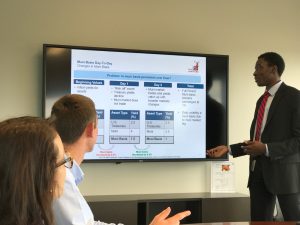
Major: Economics
Minor: Analytics
Year: Junior
What was your internship or co-op and how did you find it?

During the summer of 2017, I was a Market Risk Intern at The Hartford. In June of 2016, I took part in The Hartford’s Early Immersion Program which entailed three days of professional development workshops, team building exercises, and a case competition. As a result of the program, I was offered a position at The Hartford in September of 2017.
What was a typical day on the job like?
Throughout the summer, I worked on my capstone project which entailed investigating, researching, and quantifying the mark-to-market risk associated with general obligation bonds and 10-year Treasury notes. I also participated in the Summer Trading Investment and Negotiation Challenge. This was a stock trading game I did with other interns that allowed to develop knowledge of currency risk, VIX, and fundamental investment concepts. Lastly, every day I completed Market Commentary. This commentary was a summary which detailed market themes, geopolitical events, and as analysis of peer firms.

What was your favorite part of the experience?
The most fulfilling part of my internship was when I presented my findings to a group of 60 people, and then answered questions from the audience. I spent many hours on the project and I was glad that they were genuinely interested in what I did over the 10-week period.
What advice or encouragement do you have for other students looking to take advantage of similar opportunities?
I would encourage all freshmen and sophomores to take advantage of leadership programs. For instance, McKinsey’s Freshman Women in Computer Science Internship, Goldman Sachs’s Undergraduate Camp or GE’s Finance Discovery Program. Being a part of these programs will allow you to network with individuals at the firm and give you the soft skills that you need to be successful when you are an intern.
I would also encourage students to enroll in courses that have a hands-on component. For instance, OPIM 4895 (Visual Analytics) is a course that teaches students how to gain valuable, actionable insight from data allowing one to better communicate and interact with the findings of data analysis. Classes that teach students these types of skills are important because they help one function more effectively on a project team.
